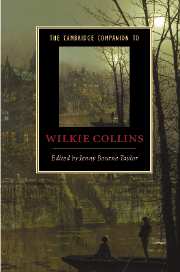Book contents
- Frontmatter
- Introduction
- 1 Collins’s career and the visual arts
- 2 The early writing
- 3 Collins’s shorter fiction
- 4 Collins and the sensation novel
- 5 The Moonstone, detective fiction and forensic science
- 6 The later novels
- 7 The professional writer and the literary marketplace
- 8 The marriage plot and its alternatives
- 9 Collins and Victorian masculinity
- 10 Collins and empire
- 11 Disability and difference
- 12 Collins and the theatre
- 13 The afterlife of Wilkie Collins
- Further reading
- Index
- Series List
3 - Collins’s shorter fiction
Published online by Cambridge University Press: 28 January 2007
- Frontmatter
- Introduction
- 1 Collins’s career and the visual arts
- 2 The early writing
- 3 Collins’s shorter fiction
- 4 Collins and the sensation novel
- 5 The Moonstone, detective fiction and forensic science
- 6 The later novels
- 7 The professional writer and the literary marketplace
- 8 The marriage plot and its alternatives
- 9 Collins and Victorian masculinity
- 10 Collins and empire
- 11 Disability and difference
- 12 Collins and the theatre
- 13 The afterlife of Wilkie Collins
- Further reading
- Index
- Series List
Summary
Wilkie Collins was adept at exploiting the narrative possibilities that the growth of magazine and periodical publishing in the nineteenth century created, and this is evident as much in the shocking, surprising and uncanny effects of his shorter works as it is in the complex plotting, suspense and multiple narrators of his major novels. Characteristically concerned with the disjunctive, inconclusive and oblique, the short story is in many ways a marginal form, which often takes marginal or outlaw figures as its central concern. It troubles itself, and thus its readers, with remarkable or strange events, with the inexplicable, disorderly and queer. Collins's stories share many qualities with his novels - an interest in detection, documentary evidence and the instability of identity, in particular - but they are also significant and distinctive texts in their own right. The flexibility and openness of the short story suited Collins and let him experiment throughout his career, as the relative brevity of the form allows him to explore his interests in erotic rivalry and compulsion, transgressions of the law, and the maskings and doubling of the self. But it is the variety of his shorter fiction that is most striking. In a career spanning nearly half a century, Collins produced not only the detective fiction for which he is best known, but also novellas (Miss or Mrs?, 1873, and The Haunted Hotel, 1879); sentimental Christmas stories (Mr Wray's Cash-Box, 1852); comic stories ('The Fatal Cradle', 1861); 'antighost stories' such as 'The Dead Hand' (1857) and 'John Jago's Ghost' (1873-4), and humorous detective fiction ('The Biter Bit', 1858). In the process he created the first British detective story ('A Stolen Letter', 1854), the first appearance of a police officer ('A Terribly Strange Bed', 1852) and the first woman detective ('The Diary of Anne Rodway', 1856). In 'My Lady's Money' (1877), he even wrote a story featuring a detective dog, another first.
- Type
- Chapter
- Information
- The Cambridge Companion to Wilkie Collins , pp. 37 - 49Publisher: Cambridge University PressPrint publication year: 2006
- 1
- Cited by



